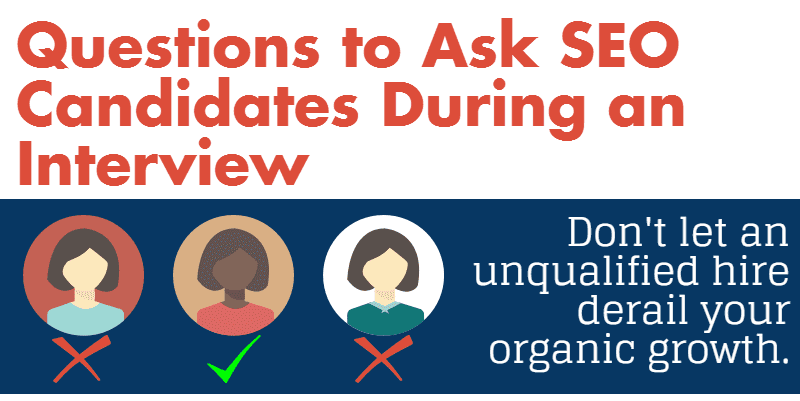11 SEO Interview Questions: Hire the Best Candidate
Along the way I discovered that one of the toughest jobs for my Chief Marketing Officer was to interview candidates and successfully evaluate their qualifications for a role working as an SEO manager or team member.
Many marketing executives I’ve worked with are generalists – talented individuals who have an MBA and a wonderful grasp of big-picture objectives and business principles, but for whom the technical skillset required for their team to function effectively may fall outside their wheelhouse.
If this sounds like you and you’re struggling to come up with effective SEO interview questions, this post can help. Don’t leave it to chance and risk hiring an unqualified SEO manager or strategist whose mistakes could set your company back months or even years.
What to Expect When Interviewing SEO Candidates
Don’t trust this as a sign of knowledge or skill. If you don’t ask the right SEO interview questions, you may pass over the most knowledgeable candidate.
To help you conduct a purposeful SEO interview, I’ve put together a list of 11 questions to ask candidates for a role on your organic search team. I’ve broken these questions out into two lists. I think you should read through them all, but if you’d like to skip to the advanced SEO manager interview questions you can scroll down to #7.
Following each interview question I’ve included a few thoughts about why I think this is an important question to ask, what some possible answers could be, and helpful tips to help you spot red-flags that could indicate you’re interviewing someone who doesn’t know as much as he or she is pretending to.
Basic Interview Questions on SEO
1. Describe the major on-page SEO elements and their importance to organic rankings.

While there are many different nuanced on-page factors which can have an effect on your SEO, the basics are your page title, meta description, url structure, the structure of your content (H1 tag, paragraph copy broken up by H2, H3 tags), properly optimized images and video content, incorporating schema.org markup if applicable, etc.
I've written a good general post on the subject, which you're welcome to review here.
A good candidate will speak fluently about the relative importance of each of these page components and the impact the can have on your organic rankings.
Expect qualified candidates to mention the length of the page's content, the topical focus of the page and the balancing act an SEO must maintain between primary/semantic keyword research and placement and user experience.
Advanced candidates may also mention details about the page’s code structure, file size, and page-load time, recommending that javascript be minified, videos should load in HTML5, that images should be compressed, and that server cache settings are important as well.
2. Describe how you would build a properly optimized page from scratch, targeting a subject area for which our company has identified a business need. No keywords or specific SEO strategy has been defined for you.
Solid responses to this question will start with a period of reflection on who the target demographic/customer is, what they want, and bring that in line with your company’s goals for that customer (do you want them to buy something, opt-in to a form, share your page, etc.).
Next, keyword research will be important. Expect qualified candidates to mention Google’s Keyword Planner, tools like SEMRush, and advanced candidates will also mention the importance of competitor research and analysis during this early stage as well. There’s value in analyzing who you will compete with, what they’re doing, and trying to do it better.
Finally, the page should be created leveraging some of the on-page SEO elements mentioned above, and when it is published your SEO should ensure that the new URL is added to your XML sitemap, and “fetched” and submitted to Google’s index via Search Console. There should also be at least one link to this new page placed on your website, though it’s usually a good time to add at least 5-10 links to ensure that the page is easily crawled and enjoys a good initial flow of authority from existing webpages.
3. Tell me about SEO work you’ve done which has produced positive results. How did you measure your success and what was the approach you took in achieving this goal?
Someone who defines success as driving company profit growth by improving a website’s rank from the third page of Google’s search results to the top 3 positions for a competitive keyword would probably be a more valuable hire than someone who published an in-depth blog post that took weeks to research and write, was admired internally, but didn’t have a clear business goal associated with it.
Asking about how an individual measures success, and their approach to achieving goals invite answers that you can learn a lot from, even if you don’t know much about technical SEO.
4. Tell me about some of the tools you’re comfortable using, and the role that they play in your approach to SEO. (You can ask specifically about SEO tools that your company subscribes to here as well to estimate how much of a learning curve each candidate would have).
Advanced candidates will discuss custom tools and API integrations they’ve worked with or built – if a candidate has experience building or developing custom SEO analysis and reporting tools, take note -- that's a good indication that they would be an instant-asset to your team and a valuable hire.
If a candidate doesn’t have experience working with the content management system used to build your website, or your primary SEO tool this shouldn’t necessarily be a deterrent in hiring them, but a basic foundation in Google Analytics and other digital marketing staples is expected, and certifications are a definite plus.
5. How do you remain focused and productive when faced with extended hours working on a monotonous project?
Answers might range from “Lots of coffee and the Pandora app on my smartphone!” to “I really enjoy working toward accomplishing a meaningful goal, and if achieving results requires hard, monotonous work, then I like to take the long view and see that work as rewarding.”
There isn’t one “right” answer here – it’s a question which allows you to get some insight into what it would be like to work with this person and whether they would fit in well with the office community you’re building.
6. How would this position fit in with your long-term career goals?
I like asking this because it invites honesty about the candidate’s desire for professional growth, and it also allows you to get a sense for whether a strong candidate looks at this position as a stepping stone toward a job elsewhere. Hiring that candidate can be a waste of time, money and resources as you may be hiring someone new again and repeating the training process in 6 months.
SEO Manager Interview Questions

Effective candidates will exhibit an acute understanding and the ability to speak fluently to the questions above, but will speak passionately and demonstrate creativity in an analytical and results-driven approach to search engine optimization.
Here are the final 5 questions:
7. Does data guide you as you build a short and long-term SEO strategy? What data points do you find to be particularly useful, and what tools do you look to when collecting and analyzing that data.
The goal with a question like this is to gain an understanding about a candidate’s qualifications, the value they place on making informed strategic decisions, and it allows you to determine if the candidate’s idea of meaningful data points align with your marketing goals.
8. Give me two specific examples of moments where you failed to achieve your desired result as an SEO Strategist or Manager. Tell me what stopped you from achieving your goal, and what you learned from each failure.
Ideally you want someone who is honest, who takes ownership of moments when things didn’t go as planned, and who doesn’t blame others for failure. You also want to see a candidate who views adversity as an opportunity for growth, and can clearly illustrate how each example of failure he or she offers has taught something which will help fuel success in a role at your company.
9. Tell me about three or four reports that you’ve learned to rely on to monitor site health and performance. What tools or techniques do you use to generate and monitor these reports efficiently?
A strong candidate will talk about scheduling regular technical site audits so that issues like 404s or de-indexed pages which can severely impact site performance are available upon arrival each morning and can be addressed first thing.
He or she should also talk about setting up dashboards and scheduling reports using Google Sheets or Google Analytics so that actionable traffic and conversion data is available each morning and time can be spent optimizing site performance, rather than generating the daily report.
The strongest candidates will impress you by displaying a sense of urgency in maintaining site performance, and a strong desire to look for opportunities to improve short- and long-term performance each day through scheduled reports.
The key word here is automation -- you're looking for a candidate who understands the value of setting up dashboards and scheduled reports so that data is analyzed daily, it isn't pulled daily.
10. When I say “Google Best Practices,” what does that mean to you, and how do these best practices inform your work as an SEO Strategist working to drive profits for our company.
While many people who interview for SEO roles will answer that Google Best Practices should always be followed, experienced and knowledgeable SEOs understand that if Google has drawn a line in the sand and said don’t cross it, you should be operating as close to or on top of that line as possible to achieve both short-term, and long-term results for your company.
You don’t want to hire someone who makes you feel unsafe, or who you feel may jeopardize the long-term organic success of your business, but you also shouldn't want to hire someone who says things like “create great content and the results will come.” The world of search is competitive, and answers like this display naiveté on the part of a candidate and (to me at least), reveal that he or she doesn't actually know how to drive results in an industry where organic search is fiercely competitive.
You want a gladiator who knows the rules of the arena and how to operate within those rules while gaining every competitive advantage he or she can over your business’s competitors.
11. Do you think your compensation should be tied to results?
I believe that compensation should be tied to the results you achieve, and that while most savvy SEO professionals recognize that some growth is at the whim of Google’s algorithm changes, the best candidates will believe in themselves and their ability to earn more by meeting or exceeding volume or profit goals you set.
What I like about this question is that it positions you well to structure an offer around a base-salary that’s below market-value, with a performance-based year-end bonus based on an agreed-upon growth figure. This offers candidates earning upside which can net out to significantly more than they could get elsewhere while protecting your company with a lower base salary in the event that results are poor.
Final Thoughts on Asking the Best SEO Interview Questions
|
While there are other questions I love to ask when interviewing SEO candidates, I hope that these 11 questions and some of the rationale behind why I ask them during SEO interivews is helpful to you as you prepare to interview candidates for your Search Engine Optimization team.
If you have a favorite SEO interview question which I have not included on this list I’d love to hear it – please share it in a comment below! |

